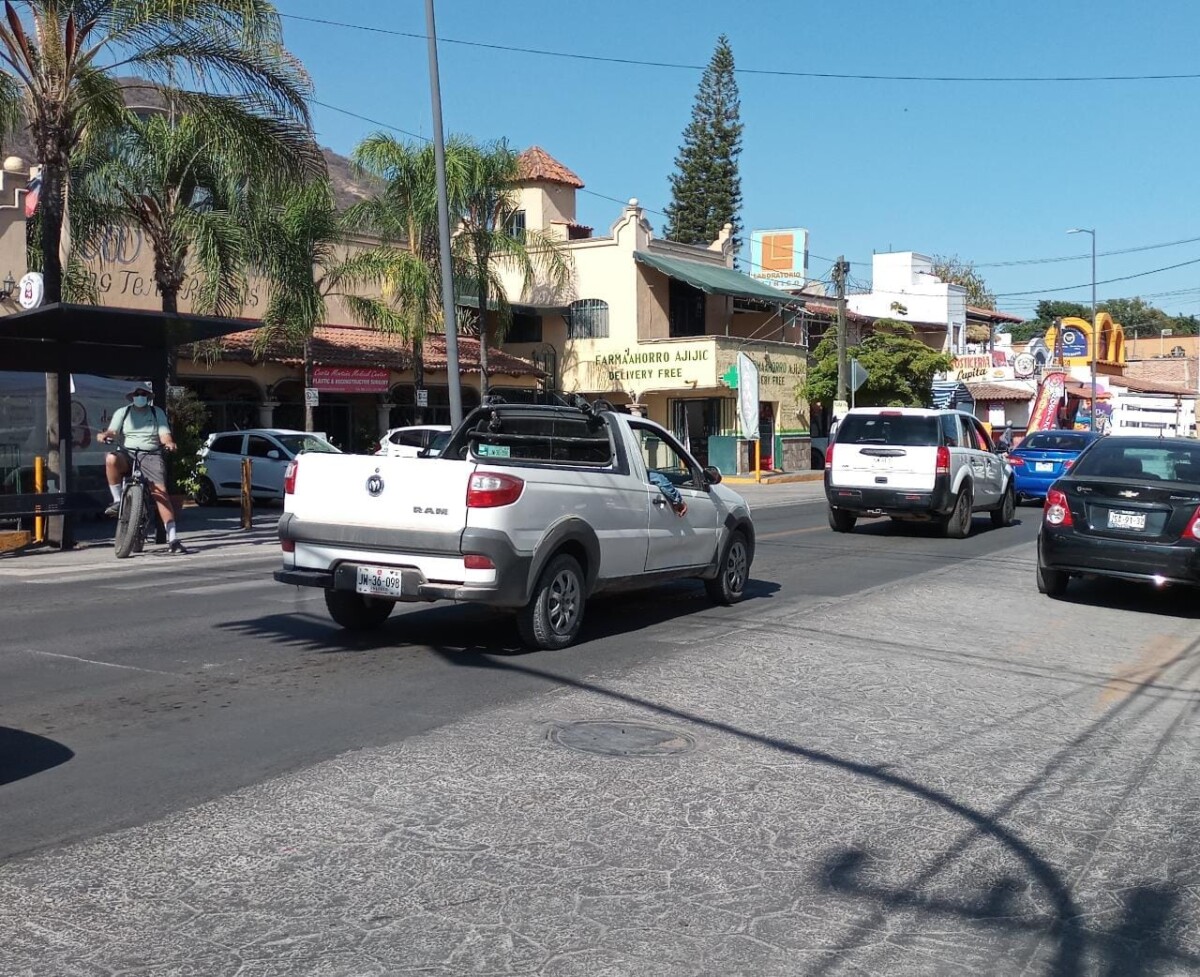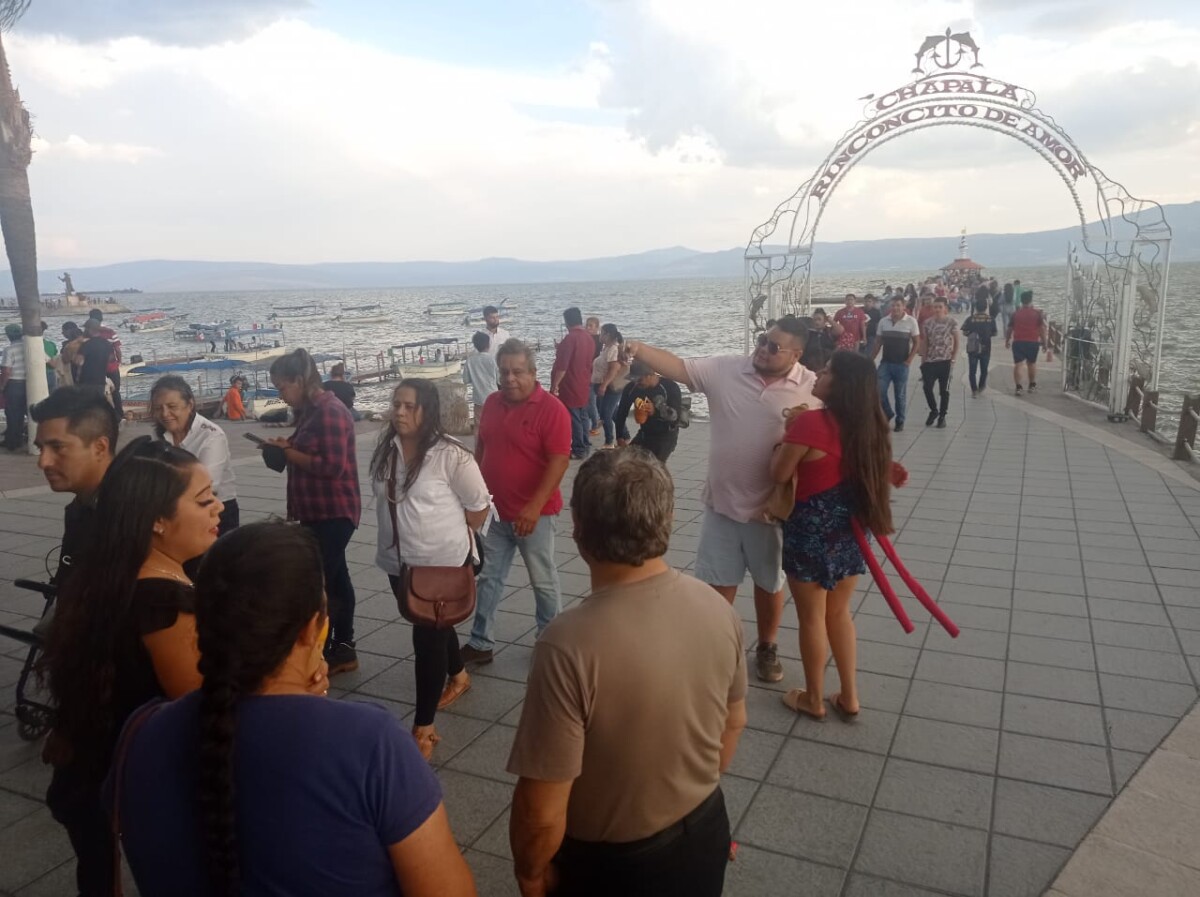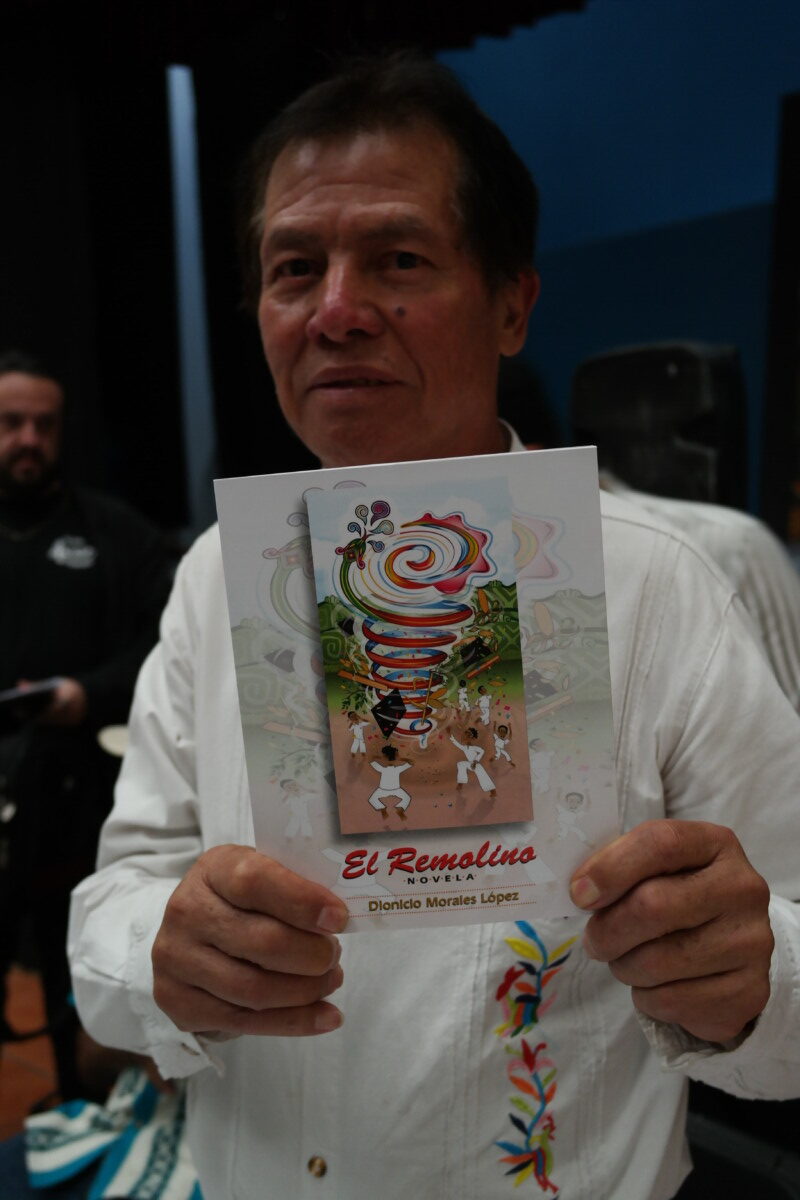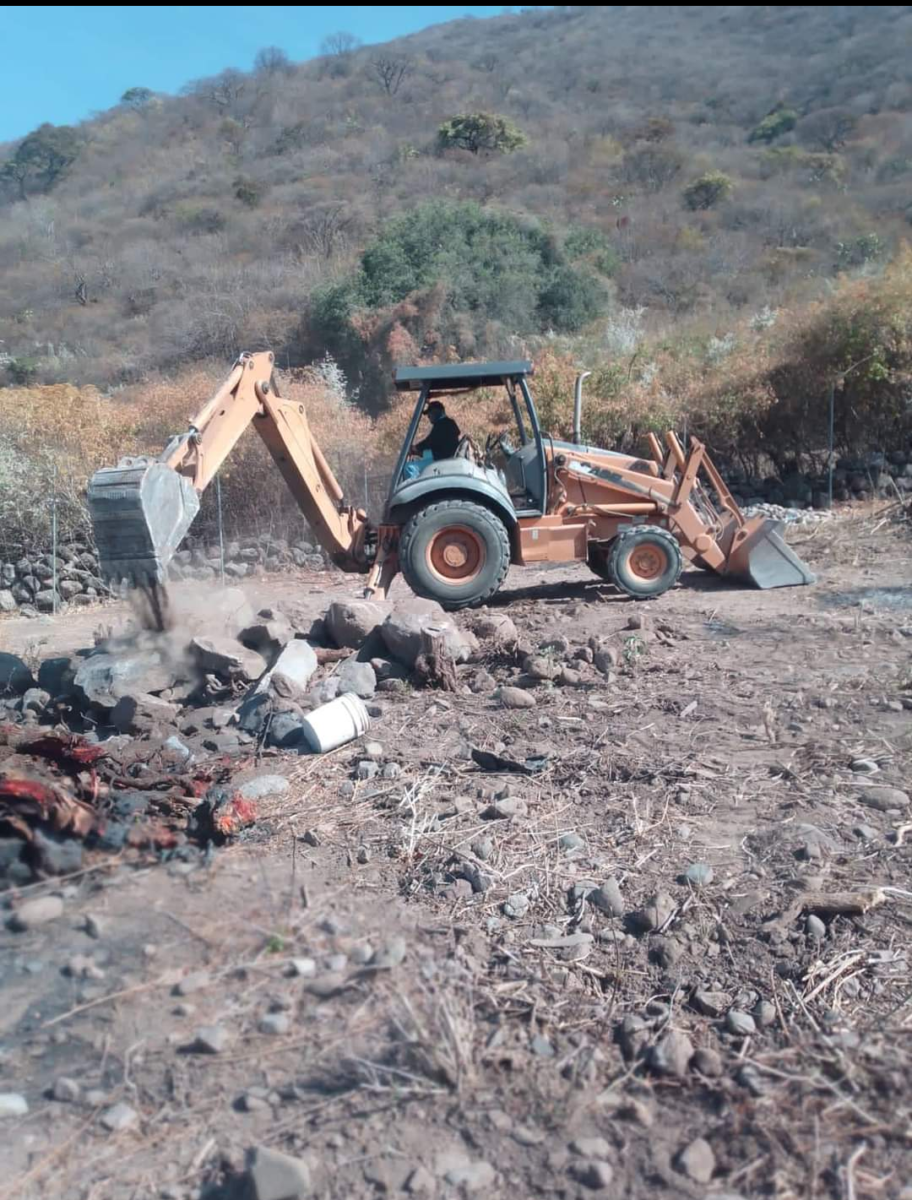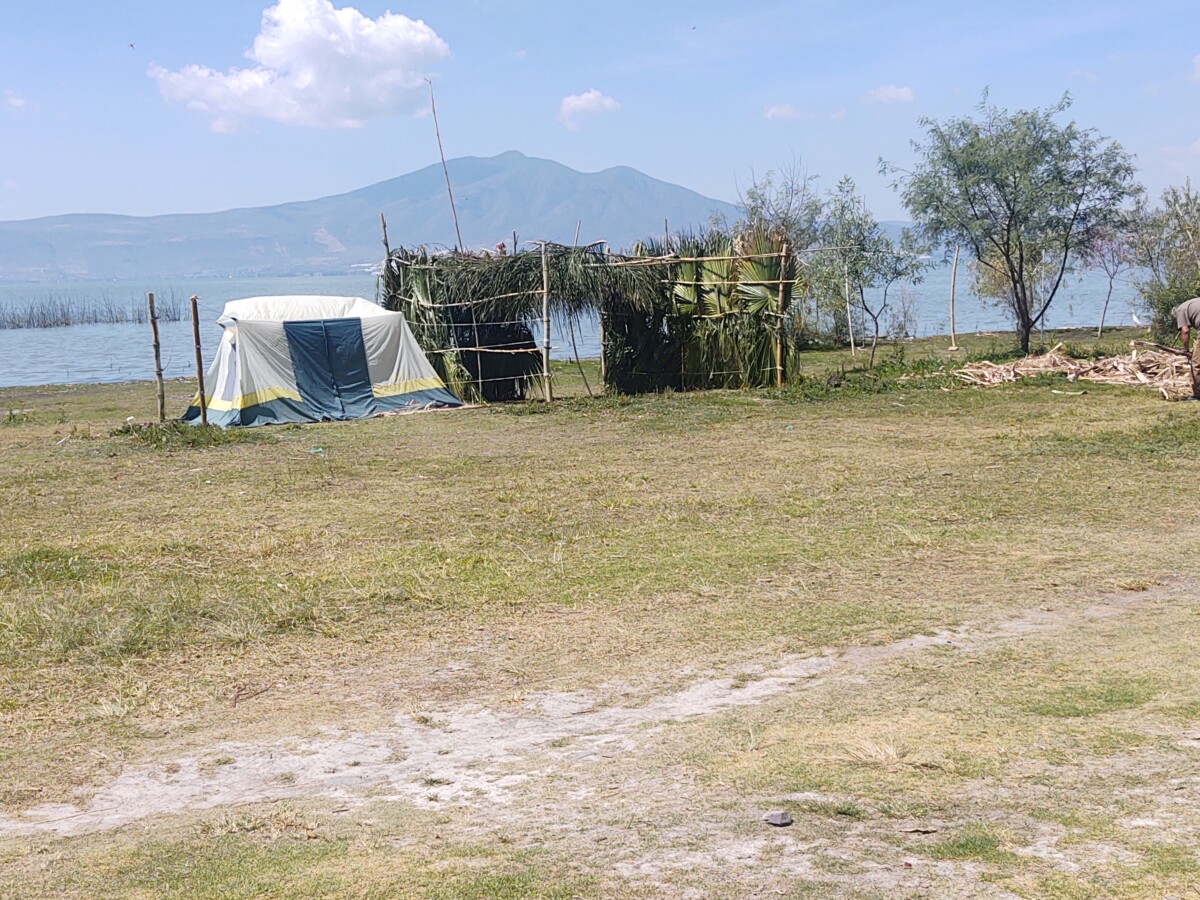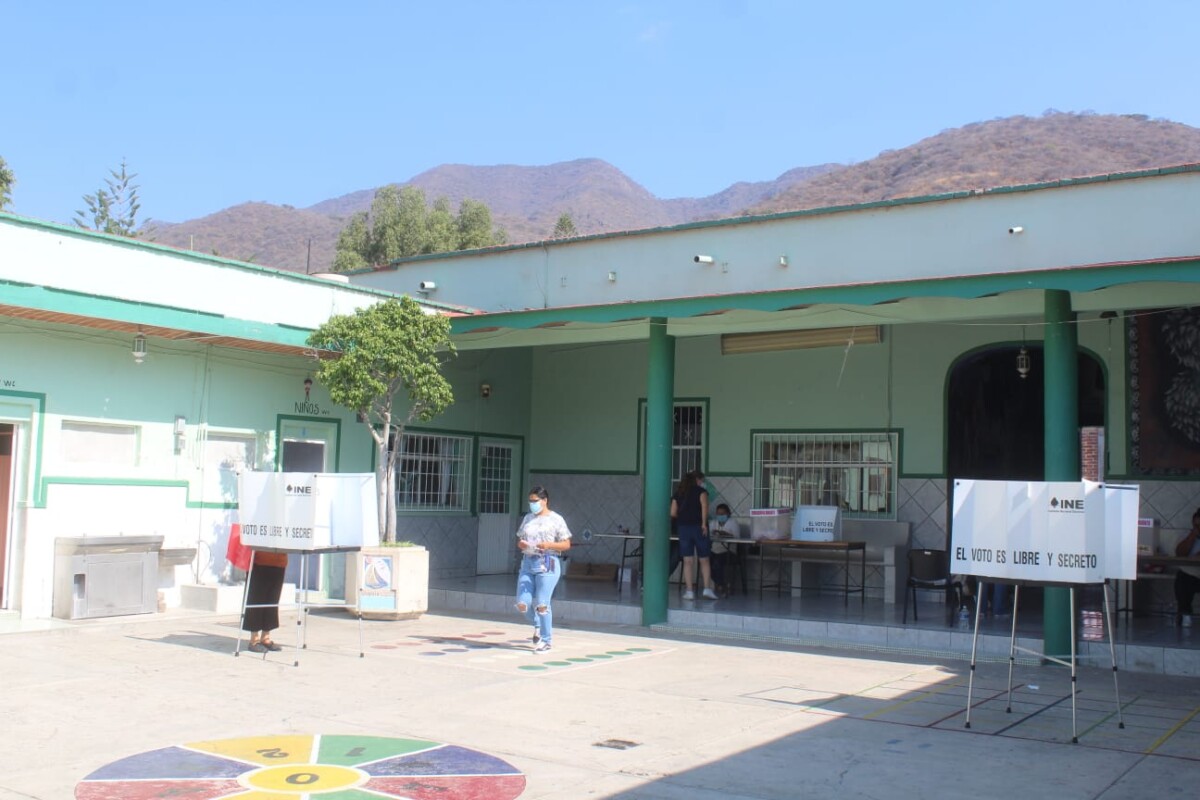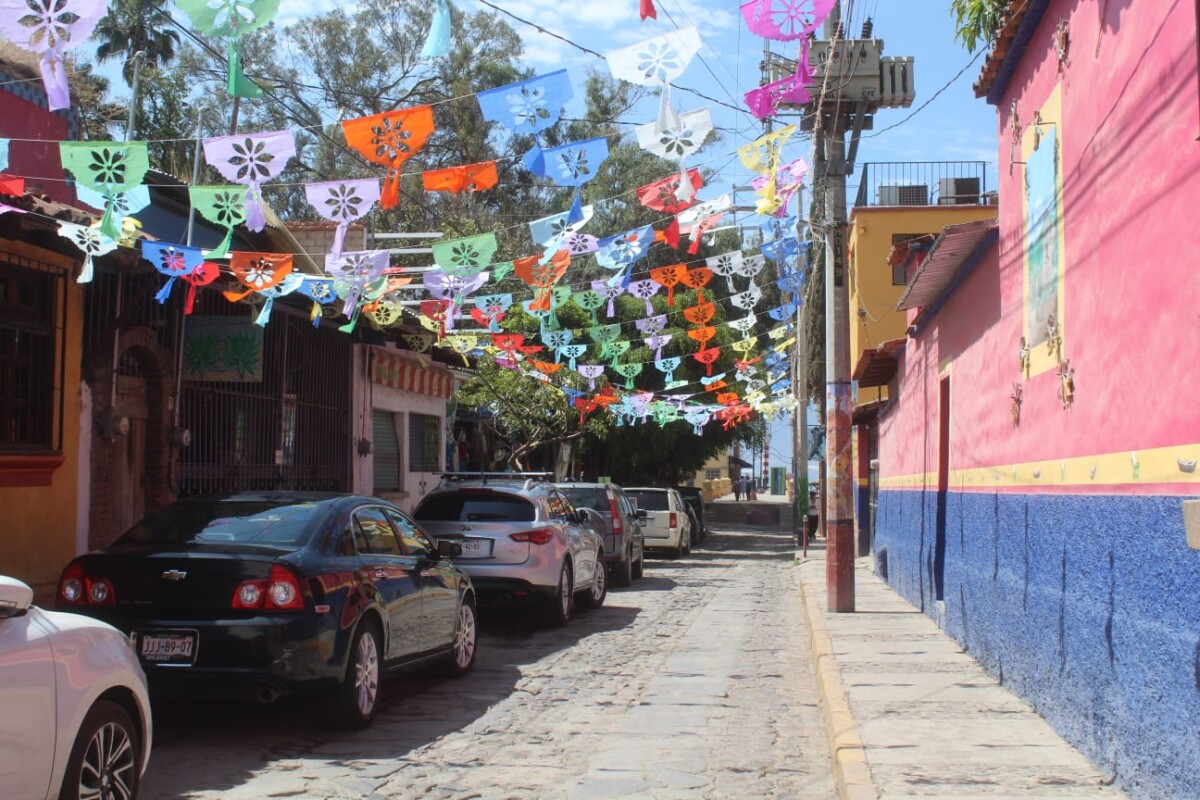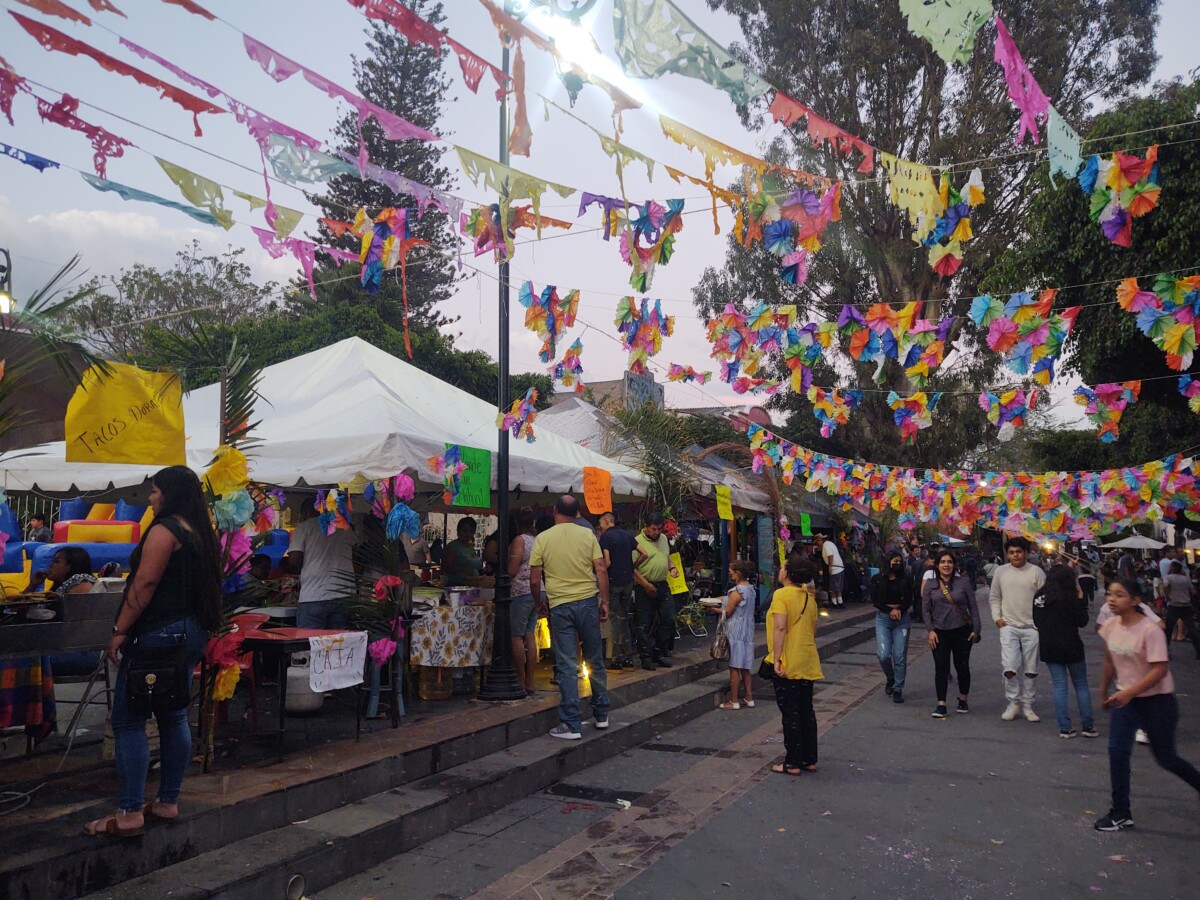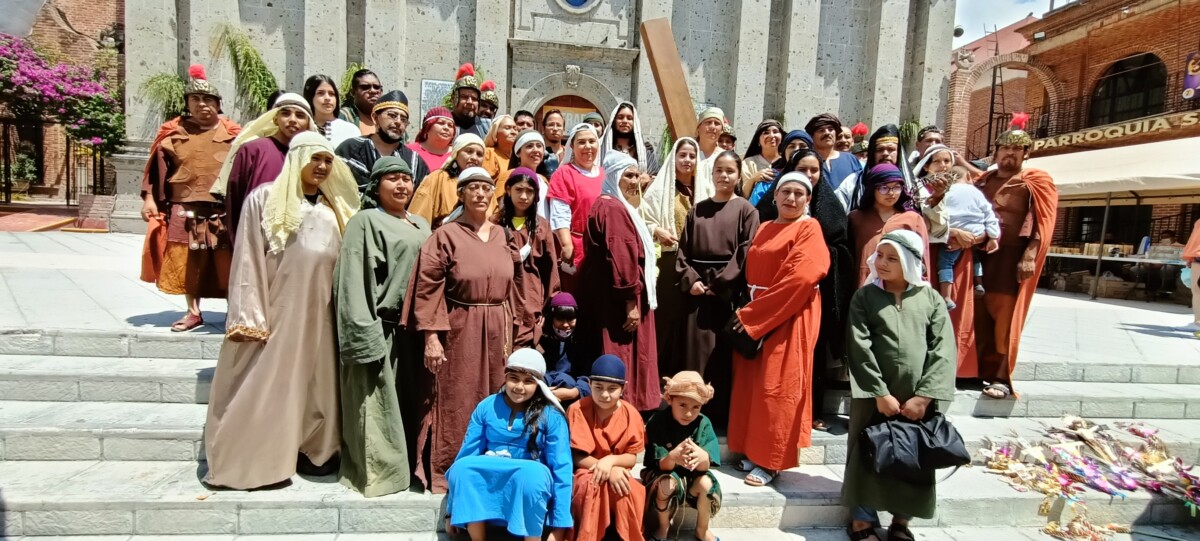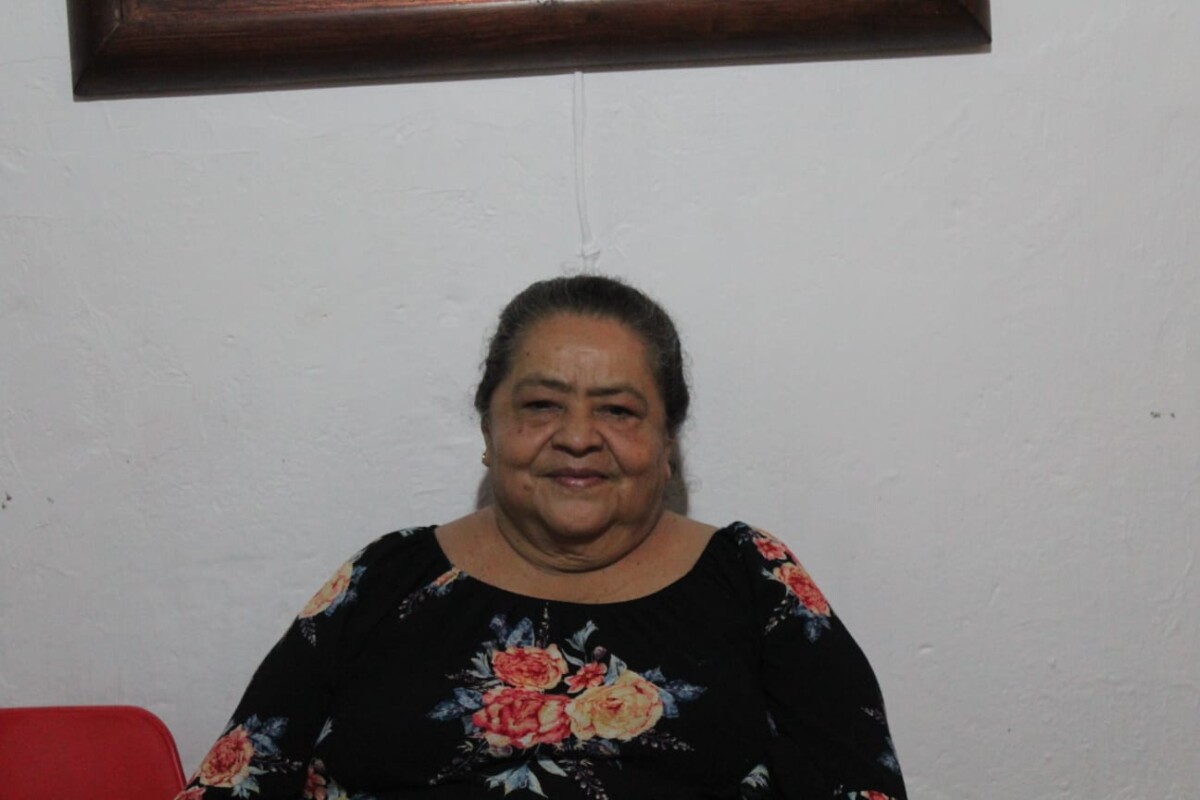Ajijic
Agilizaron paso por Ajijic durante vacaciones
Cruzar en auto Ajijic durante Semana Santa fue rápido y sin complicaciones.
Redacción.- El intenso tránsito vehicular de la carretera Chapala-Jocotepec, a la altura de Ajijic, quedó eliminado, al menos durante las vacaciones, ya que se pudieron observar a agentes viales en cada semáforo, para controlar el paso de vehículos y así evitar congestionamientos viales, resultando una estrategia exitosa al no presentarse “atorones” en este punto que se ha vuelto bastante conflictivo.
En el operativo para agilizar la vialidad generó el incremento en el número de elementos trabajando, siendo 14 personas en la zona de Chapala y Ajijic, cuando regularmente son seis y sin que en Ajijic se desactiven los semáforos; en esta ocasión, fueron los elementos viales quienes, a criterio, se encargaban de dar el paso a peatones y automóviles que buscaban incorporarse a la carretera o ingresar al Pueblo Mágico.
La implementación de este operativo en la carretera de Ajijic tuvo buenos resultados, ya que en hora pico y en días de asueto, la zona era fluida y los peatones no tenían que esperar tanto tiempo bajo el sol para cruzar la calle.
Aunque no se especificó una fecha para que en Ajijic se implemente nuevamente esta estrategia vial, el Gobierno Municipal informó que están en proceso para incrementar el número de elementos viales y así darle solución a la vialidad que en fines de semana sufre de severas saturaciones ante el paso e ingreso de turistas.

Quienes también se ganaron el reconocimiento de la sociedad fueron los elementos de la Secretaría de Seguridad Pública de Jalisco, quienes durante el operativo vacacional auxiliaron a un automovilista que se había quedado en las curvas de Ixtlahuacán de los Membrillos, mientras que en el tramo del libramiento Chapala-Ajijic, oficiales de la policía municipal también auxiliaron a otro automovilista que sufrió una avería en su unidad.
¿Qué hacer el fin de semana en Chapala?
Visitantes en el malecón de Chapala durante el Domingo de Ramos 2022. Fotografía: Jazmín Stengel.
Jazmín Stengel.- Desde el lago más grande de México, hasta sus montañas y Pueblo Mágico, el municipio de Chapala es el lugar perfecto para disfrutar de tus fines de semana. Si tú te encuentras de vacaciones por aquí no puedes dejar de visitar o realizar ciertas actividades que te harán vivir una experiencia única.
Pero, si el gusto dominguero es reunirte con tu familia o entre amigos puedes visitar los hermosos malecones. La cabecera municipal cuenta con el malecón más conocido de la ribera de Chapala, donde las espectaculares vistas son ideales para la foto del recuerdo, además de contar con una zona comercial y puestos de comida.
Otro atractivo es el Parque de La Cristianía. El parque más grande del municipio cuenta con comedores, áreas recreativas y desde luego vista al lago. Ideal para días de campo y celebraciones, cuenta con área de comedores con asadores y juegos infantiles. Este año se habilitó la alberca para uso de los turistas. El parque está ubicado por la avenida González Gallo, en la cabecera municipal de Chapala.
Ajijic es probablemente el segundo malecón más conocido de la ribera. Cuenta con extensas áreas verdes con asadores, además de área de juegos infantiles y diversos puestos con venta de botanas y artesanías. Además, por la calle Colón encontrarás galerías, diversas tiendas de ropa y artesanías,
Los malecones de Ajijic y Chapala cuentan con muelles con embarcaciones que ofrecen paseos por el lago, a la isla de Los Alacranes o la del Presidio; esta última ubicada en Mezcala, delegación de Poncitlán. Los precios de los viajes varían según el paquete, número de personas y puntos de interés que el grupo deseé visitar.
Las zonas gastronómicas y de bebidas también son muy concurridas por la extensa oferta de platillos elaborados a base de mariscos y comida regional, destacando el caldo Michi elaborado a base de pescado en Chapala. En la zona conocida como Acapulquito, en el malećon de la cabecera municipal puedes disfrutar de diferentes platillos elaborados a base de mariscos.
Si tu gusto culinario es más exigente, el Pueblo Mágico de Ajijic cuenta con una extensa variedad de restaurantes que harán de tu visita toda una experiencia.
Para finalizar, el municipio de Chapala cuenta con una amplia variedad para atender al turista con más de 166 restaurantes y bares, además de 57 hoteles y un motel registrados, que harán de tu visita a la ribera inolvidable.
Presenta Dionicio Morales ‘El Remolino’, su segundo libro
Dionicio Morales presentó su segundo libro “El Remolino”. Foto: Arturo Ortega.
Sofía Medeles– “El Remolino», segundo libro del artista de Ajijic, Dionicio “Nicho” Morales, fue presentado el pasado sábado 9 de abril, en el Centro Cultural, entre cuentacuentos, degustación de tamales, atole y ponche.
Este libro, según lo que se dijo en la presentación, es un cuento que incluye elementos étnicos y prehispánicos, arte, la vida rural de Ajijic, y sencillez sin pretensiones. Adelantaron que el texto invita a ponerse en contacto con el niño interior, recuperarlo y recordar lo que es vivir la infancia.
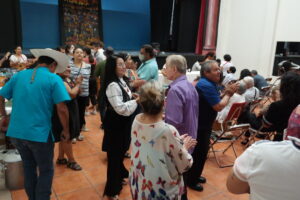
Durante la presentación, se amenizó con música en vivo y además hubo degustación de tamales, atole y ponche. Foto: Arturo Ortega.
Los escritos de Nicho se pueden comprar en su galería La Peña de Santos Rico, ubicada en la calle Constitución #16, en el centro del Pueblo Mágico.
Dionicio Morales, es un pintor y escritor de Ajijic, con dos libros publicados, y uno de los fundadores del Centro Cultural de la delegación.
Former officials accused of attempted illegal land seizure
On April 12, a machine entered the Los Tepetates property. Photo: Gloria Reza (Facebook).
The Ibon family, owners of a property in Ajijic, reported on April 12 that ex-officials of Chapala tried to use false documents in an attempt to seize their land.
The property owners named the alleged invaders as
- the lawyer Omar Pérez Contreras, who previously served as head of a secretary of the Public Registry of Property. Pérez Contreras also was named in the case of federal invasion in San Antonio Tlayacapan, by the former candidate for local congressman Jesús Arambul Solorio;
- Tonatiuh Cañedo, ex-director of Regulations, Inspection and Surveillance of Chapala, and
- Sergio Antonio Macías Aldana, a notary based in Tuxcueca. Macías Aldana was suspended in January 2020 for 18 months; although the reason is not known, it is speculated that it was due to bad practices.
Sofía Medeles.- The Ibon family claims possession of the property called «Los Tepetates” because they have had the deeds since 1950 which they have kept by inheritance. This property is in La Floresta, next to the Riviera Alta subdivision.
Members of the family found out about this invasion thanks to their neighbors, with whom they have a long-standing friendship, who informed them that heavy machinery had entered their property on Tuesday, April 12. Family members visited the property, where they were threatened by Omar Pérez, Tonatiuh Cañedo and Macías Aldana.
Municipal police were called and verified the deeds, confirming that the supposed owners were incorrect and supporting the Ajijic family.
One of the co-owners stated, «There were several inconsistencies in the deeds they presented. They were looking for the land ‘Los Ahuilotes’, when ours is called «Los Tepetates.» Another inconsistency is the year of acquisition. Their deeds are from 2009 while ours have been in the family for more than two generations. We do not know either the claimants nor the people who they claim sold them the land.»
In addition, the family stated that they found out that the accused had been looking for information about the property and the owning family, offering money and land in exchange for information.
After a heated discussion and the intervention of the police, the alleged invaders gave in and removed their machine, stating that they would look for the land they owned.
«We do not believe it was a mistake, but an attempt at dispossession because of the way they handled themselves and the previous conduct of those involved. There have been similar incidents in Ajijic and San Antonio,» stated one of the complainants.
Finally, members of the Ibon family warned landowners near their property and landowners in general, to be on the alert because similar incidents have been reported. They acknowledged the support they received from Ajijic residents and friends who alerted them and provided them with the necessary information for their investigations. They also asked the authorities to be aware of these practices and methods of invasion, and dispossession of land.
Translated by Elisabeth Shields
Easter camping in Ajijic will have rules and timetable
On the beach at the end of Francisco Villa Street, some tarps can already be seen. Photo: Sofía Medeles.
Sofía Medeles . – This year, the residents of Francisco Villa Street have the permission of the delegation to carry out their traditional camping on the shore of the lake during Easter Week, from Thursday, April 14 to Sunday, April 17.
Acting Ajijic delegate Maximiano Macías Arceo said campers came to ask for permission, which was granted, although with some restrictions. For example, tents and tarps can be put up at the end of Francisco Villa Street and the beach of La Crucita.
In addition, the hours for listening to music will be limited. Although he did not mention an exact time, he said he does not want any problems with the neighbors who live near those beaches.
“It is not just for campers, but also any private home or business where they are exceeding the limit of both sound and hours,” Macías Arceo said. “If they do exceed the limits, public security will visit them to maintain order.”
Another topic he mentioned was the garbage generated. He asked for the cooperation of campers to keep the beaches as clean as possible. He said campers must remove their tents or palm leaf huts when their visit is over.
“On Easter Monday, April 18, they should no longer be there,” Macías Arceo said. “We trust they will be responsible and follow the restrictions.»
The tradition of camping on the shores of the lake during Holy Week began in 1992. Families go to the beach, set up their tents and stay on Holy Days – Thursday, Friday, Saturday and Sunday – to spend time with their neighbors.
Translated by Mike Rogers
Ajijic turnout low in presidential recall referendum
A total of 969 votes were counted in the three polling stations installed at Marcos Castellanos Elementary School. Photo: Sofía Medeles.
Sofía Medeles.- The three polling stations installed in Ajijic for the exercise of the Revocation of Mandate 2022 to which the President of the Republic, Andrés Manuel López Obrador (AMLO) acquiesced on April 10, registered low participation.
According to data from the National Electoral Institute (INE), there were a total of 969 voters in the three polling places in town. These were located in: the María Montessori Kindergarten which was for section 466; the Saúl Rodiles Piña Elementary School for section 467; and the Marcos Castellanos Elementary School, which had a nominal list for sections 468 and 469.
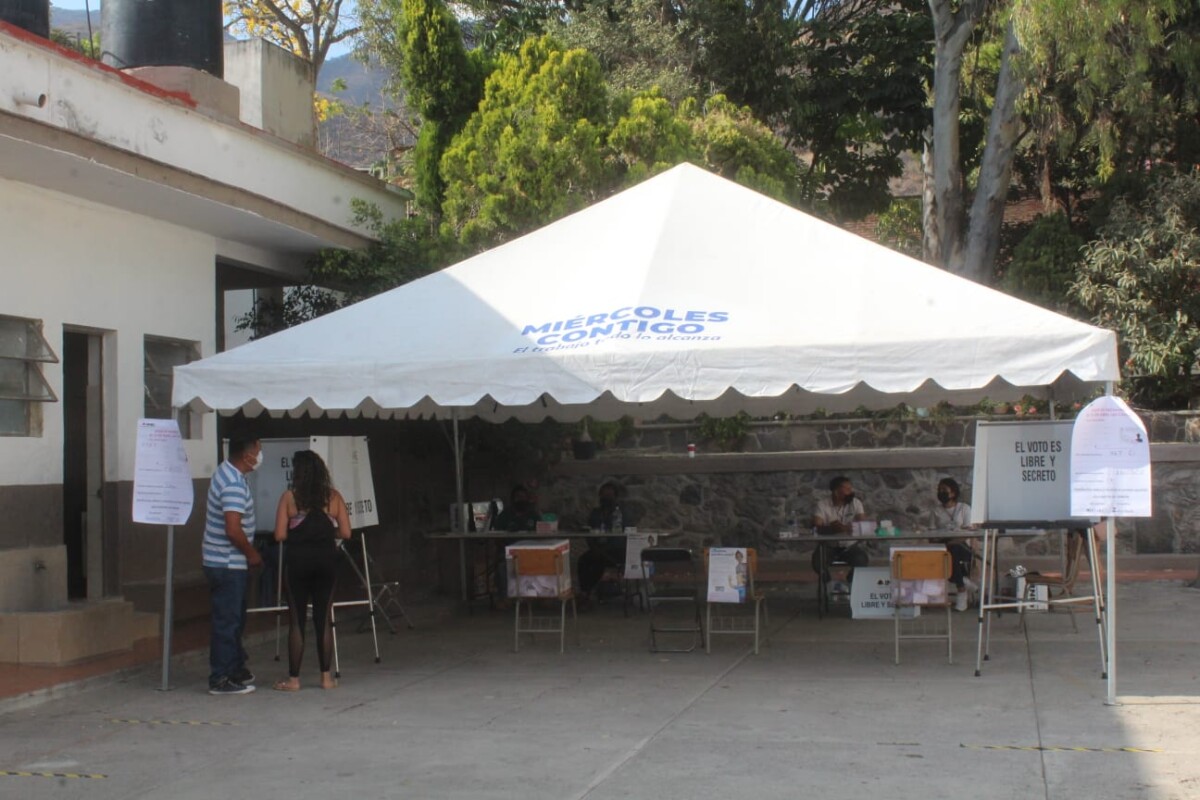
Ballot box at Saúl Rodiles Piña Elementary School. Photo: Sofia Medeles.
Each polling place had more than one thousand ballots available, according to the number of people on the nominal list. At Kínder María Montessori there were 294 votes registered; 255 for AMLO to continue in office, 31 to be recalled and eight null votes.
At Saúl Rodiles Piña Elementary School, 298 votes were counted: 269 in favor of AMLO, 19 votes against, and ten null votes. Finally, at Marcos Castellanos Elementary School, which had the largest turnout, 397 votes were recorded, of which 335 were for the permanence of the President of the Republic, 41 votes in favor of the recall and one null vote.
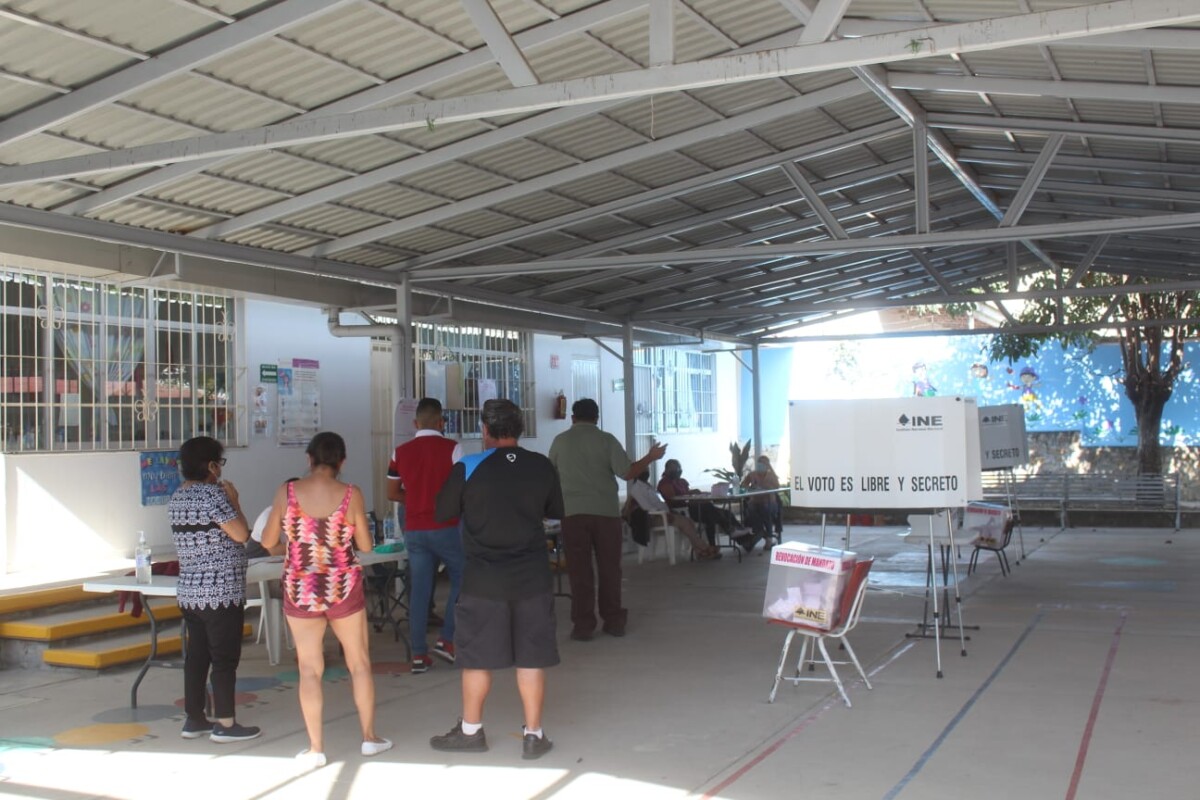
Ballot box at María Montessori Kindergarten. Photo: Sofía Medeles.
The three polling place officials in charge, Cesar, Lourdes and Jose Jorge, said that in spite of the fact that the polling place opened shortly after 8:00 a.m. and closed at 6:00 p.m., there were no incidents during the day. However, they pointed out the lack of participation was due to the lack of knowledge on the part of the population regarding this session.
Although on this occasion, participation was not as low as in the popular consultation on the trial of the former presidents held in August 2021. Sunday, April 10 was calm, according to the officials who attended the polling stations.
Translated by Sydney Metrick
Downtown Ajijic welcomes holiday tourists with colorful papel picado overhead decorations
Papel picado with figures, chains and papel picado in strips can be seen in Colón street. Photo: Sofía Medeles.
Sofía Medeles.- To welcome visitors during Holy Week, personnel from the Ajijic delegation placed sheets of papel picado in different shapes and colors along Colón Street and on the kiosk in the main square, as well as on the streets for the Passion of Christ.
Since the beginning of last week, on Colón Street, different types of papel picado have been hung from roof edge to roof edge, along the stretch from Hidalgo Street, by the main square, to the boardwalk.
Acting Ajijic delegate Maximiano Macias Arceo commented that this initiative was applauded by people who have businesses on the road, but that it will only last for Holy Week, since they will be removed the following week, with the exception of the papel picado decorations in the plaza.
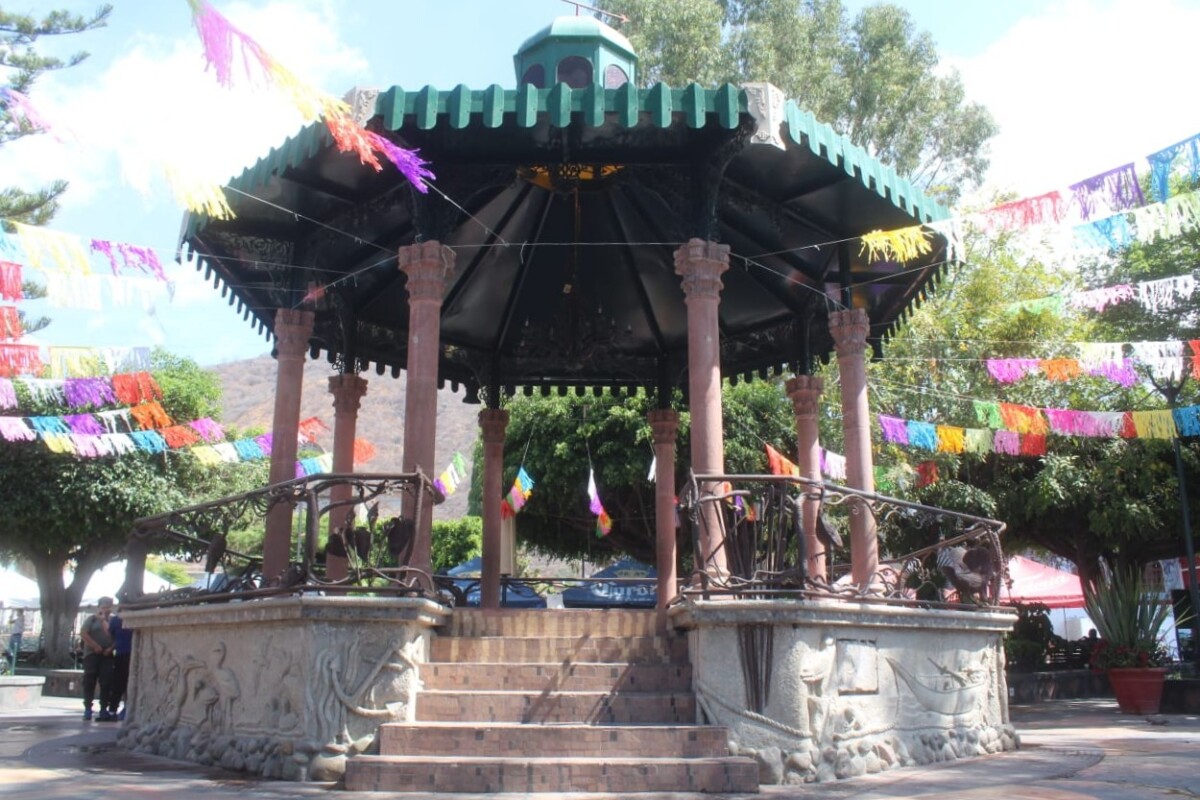
Although the kiosk already has papel picado or cutout paper, it will be replaced in the next few days for the festivities. Photo: Sofía Medeles
«We were told that it is a bad idea to put paper and that it would be better to use plastic composure, because of its durability, but we wanted to follow traditions, and the tradition of Ajijic is to use paper. It will only last this week, but the one that will be placed in the plaza, if we want to leave it for a long time, and change it to be in accordance with the upcoming festivities,» he shared.
In addition, Macías Arceo said that the pedestrian walkway will be maintained from Thursday to Sunday and the beach in front of the Old Posada will be used as a parking lot with a capacity of up to 150 cars.
Translated by Kerry Watson
Verbena Jamaica del Pasado benefits 20 sick Ajijic residents
The stalls, decorated with palm leaves, were placed on the main square. Photo: Sofía Medeles.
Sofía Medeles (Ajijic).- The purpose of this year’s Verbena Jamaica del Pasado was to support Manos Solidarias, a group that helps sick people in Ajijic. A total of 20 families of sick people benefited from the kermesse (community fundraiser) held on April 10.
Verbena Jamaica del Pasado is a local event that goes back more than 120 years, where typical Mexican games are played, traditional food is shared or sold,such as tacos, sopes, enchiladas, pozole, tamales,, all prepared by Mexican families who have done so for many generations.
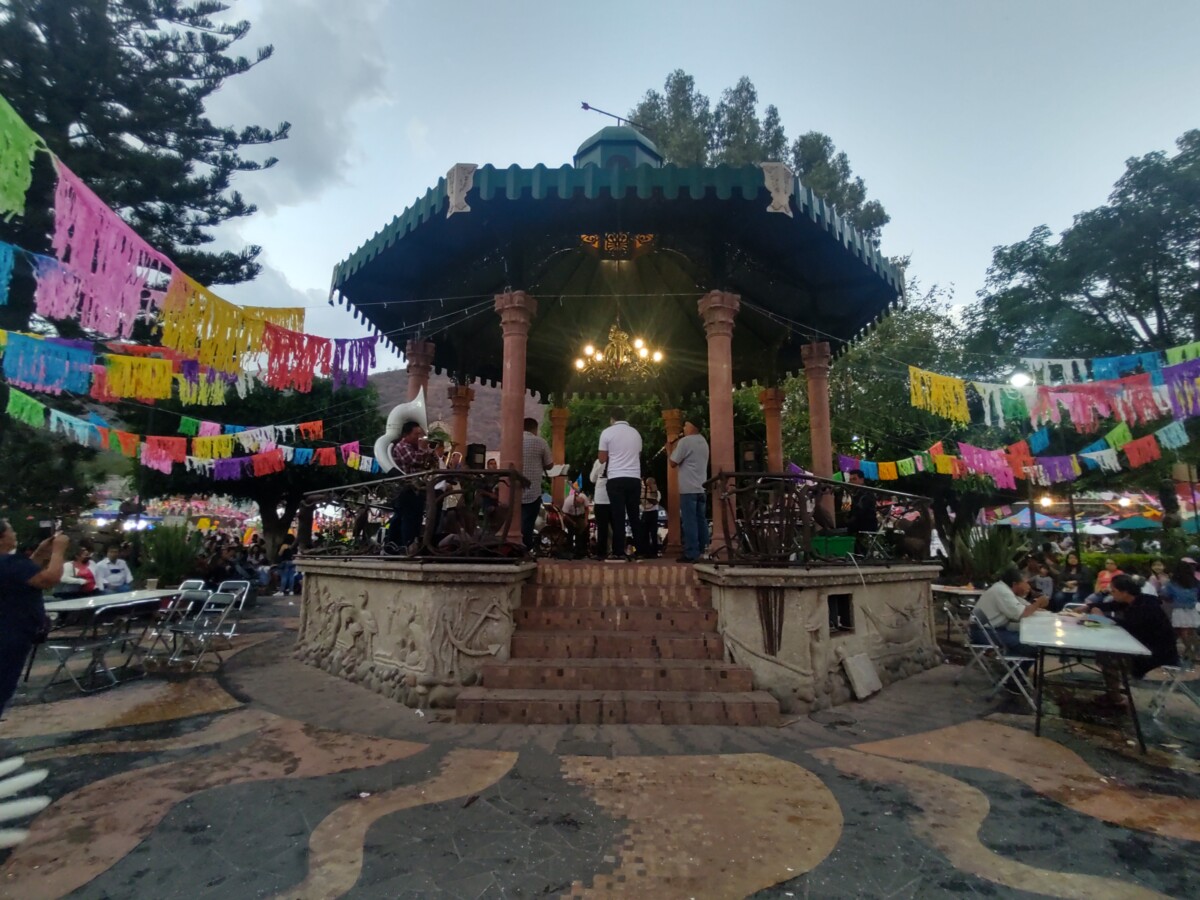
The kiosk was also decorated with papel picado. Photo: Sofía Medeles.
Although the group Pasión de Cristo, which is in charge of the organization of the popular festival, participated with two food and drink stalls, most of the stalls were from relatives of people with illnesses that require high-cost treatments and other medical expenses.
In this edition the verbena extended much longer than usual, having food, drinks, desserts, confetti eggs, and lottery from 8:00 in the morning until 10:00 at night. In some of the stands they had to look for alternative food to sell to cover the longer schedule. The people who sold menudo, for example, at the end, sold roasted meat.
The papaqui, a traditional game that consists of throwing confetti eggs among the attendees, could not be performed, since the musical group did not know the song that is played during this game. Another tradition, the «light of the past,» in which the electric lights are turned off and candles are burned in lamps made of crepe paper to resemble stained glass, was also omitted since the short drizzle that occurred wet the lamps enough to make them unusable.
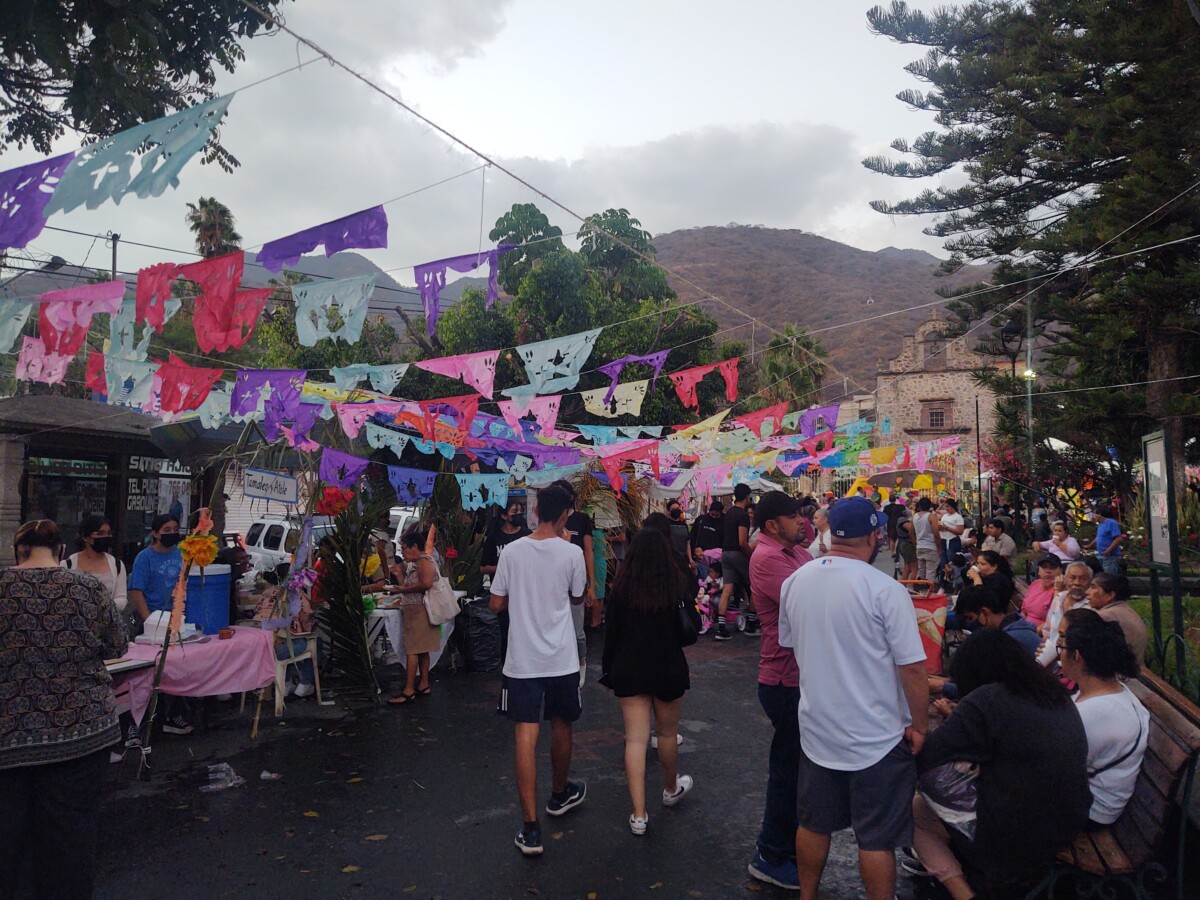
In spite of the rain, many people remained in the plaza, enjoying the music and the food booths. Photo: Sofía Medeles.
One of the members of Manos Solidarias commented that a donation box was also placed in the main square, in which a little more than four thousand pesos were collected and which was originally going to be distributed among the 20 families that participated. However, both the participants and the group opted to give that money to sick people who could not participate: Sara Enciso, Carlos Pérez Gudiño, Niño Santacruz and Jorge Vega.
Finally, Manos Solidarias stated that they hope to organize another event soon in order to continue supporting the sick and, for his part, Eduardo Ramos Cordero, general director of Pasión de Cristo, supported the idea.
Both groups thanked the contribution of the inhabitants of Ajijic, the tourists who joined in and the visitors from other towns for supporting the cause.
Translated by Sandy Britton
Palm Sunday commemorations returned throughout Lakeside
Cast of the Passion of Christ in the atrium of the parish of St. Francis of Assisi, which this year will have 60 interpreters, plus staff to assist them. The main roles are those of Jesus, Mary, Herod, Pontius Pilate, Judas, and the Priests of the Sanhedrin. Photo: Jazmín Stengel.
Jazmín Stengel.- After two years of not appearing due to the pandemic, the cast of the Chapala 2022 Stations of the Cross made its first public appearance with the re-enactment of the «Triumphal Entry of Jesus into Jerusalem», in the parish of San Francisco de Asís, in the municipal capital of Chapala.
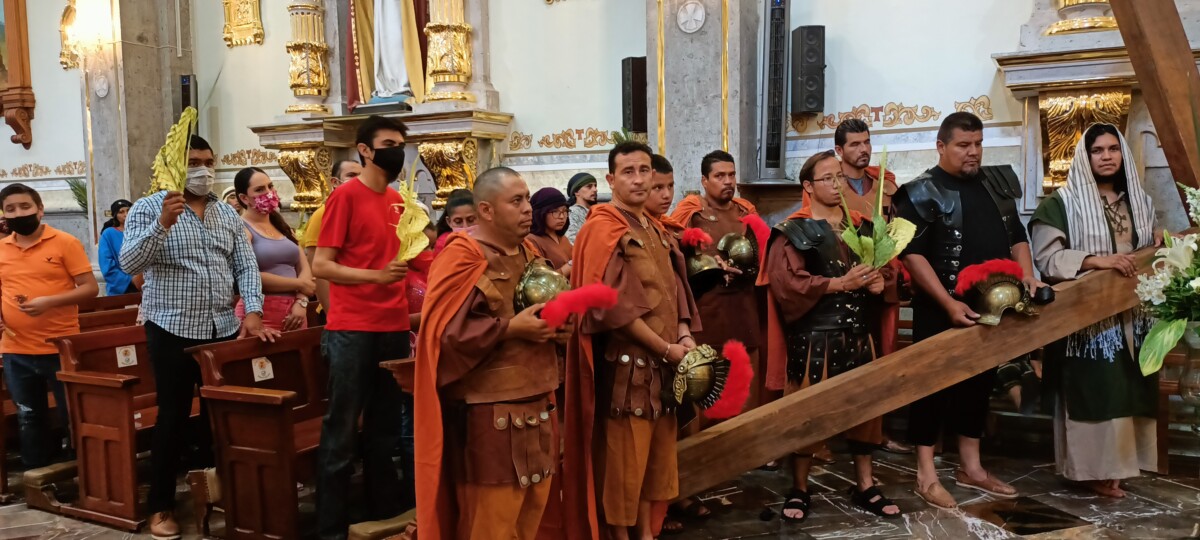
The cast of Viacrucis Chapala 2022, was presented for the first time during ‘The Triumphal Entry of Jesus into Jerusalem’, in the parish of St. Francis of Assisi on Palm Sunday. Photo: Jazmín Stengel.
About 300 people attended the 1:30 pm mass on Palm Sunday to bless their palm branches during the Eucharist, where Joel Salvador Torres Arrayga, 25 years old, stood out in the role of Jesus.
Sixty people form the cast that accompanies Jesus Christ throughout the representation of the trial and his journey to the crucifixion. Joel Salvador played Jesus, Athziri Guadalupe Martínez Real was the Virgin Mary, José Roberto Michel Mendoza was Pontius Pilate and in the role of Herod, Ramiro Moreno López.
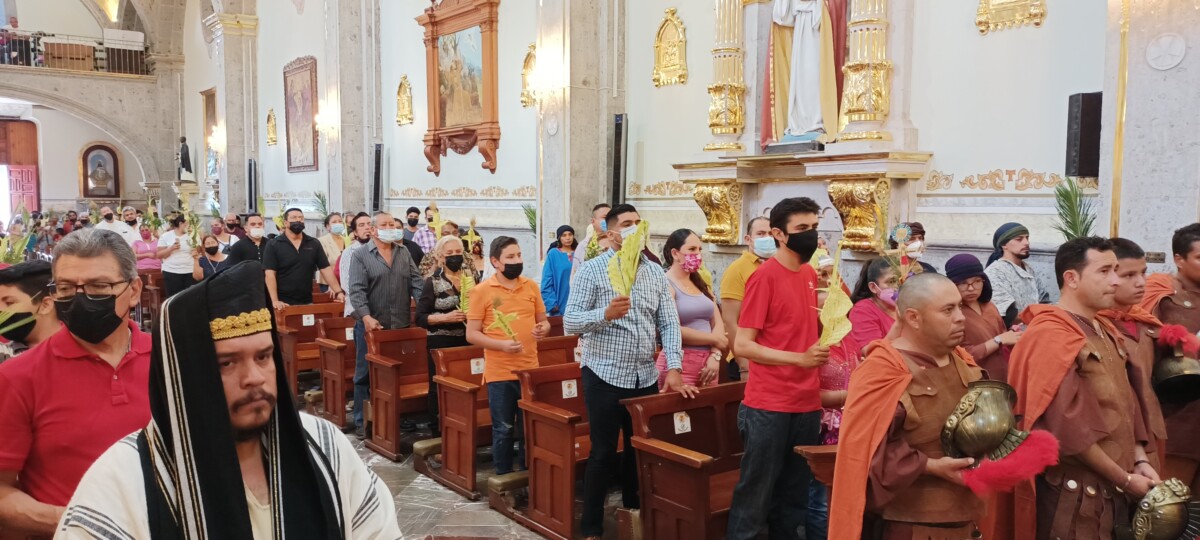
The palm branches to be blessed during Palm Sunday, mostly made of wax palm and wheat, were accompanied by laurel and rosemary. Photo: Jazmín Stengel.
Jesús Alfonso Basulto Anaya participated as Judas, while Carlos Aguayo Ramírez and Jorge Alfonso Villegas López were the priests of the Sanhedrin. The play will be presented on Good Friday, April 15, starting at 9:00 a.m. in the parish atrium.
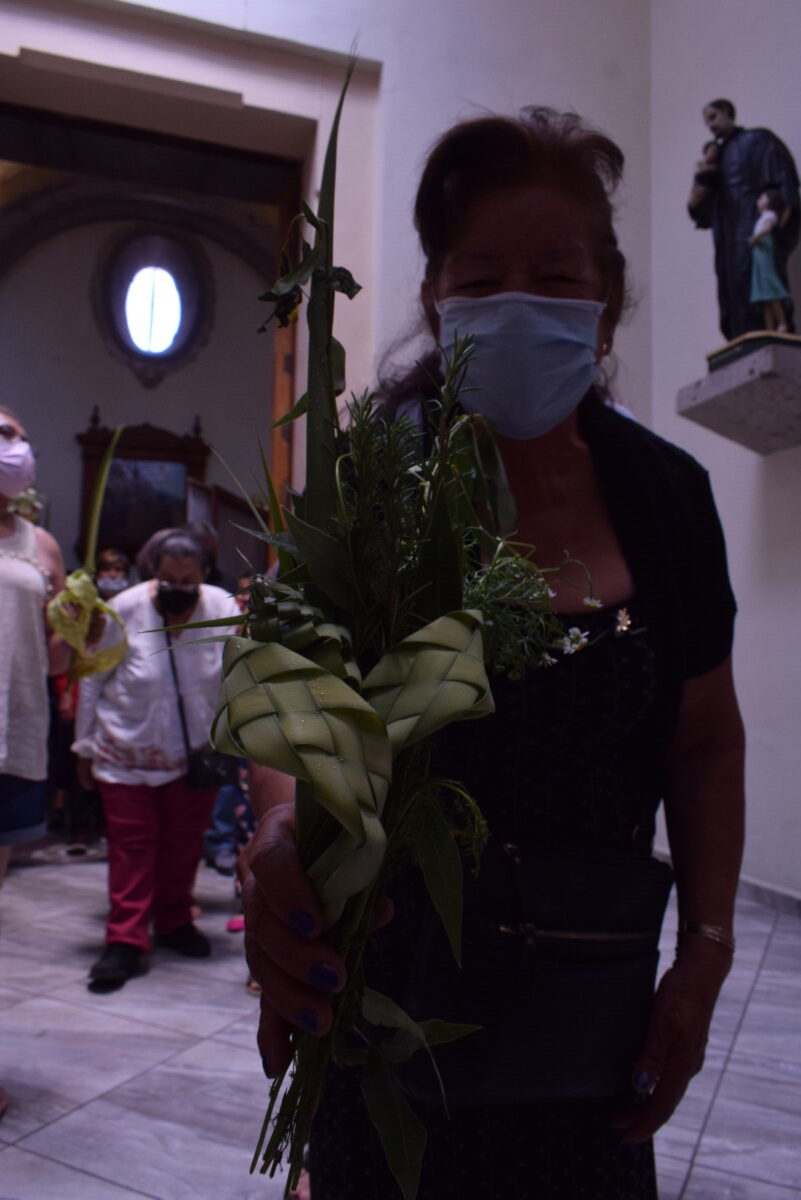
Parishioner during Palm Sunday service Photo: Jazmín Stengel.
The Palm Sunday celebration took place in all the masses starting at 7:00 am in the neighborhoods of Guadalupe, Tepehua, Lourdes and La Purisima, plus the parish of San Francisco de Asis, in whose precincts they were able to gather from 100 to 300 people per mass, according to one of the collaborators of the parish temple.
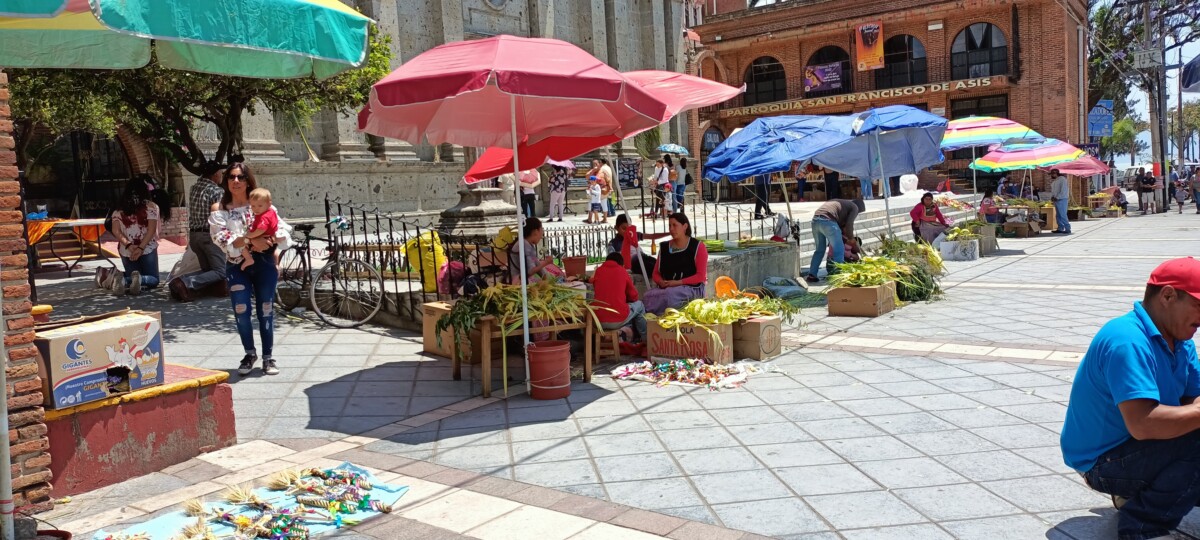
Outside the parish church of San Francisco de Asís, six stands from Michoacán were set up selling bouquets made of wax palms and wheat. Photo: Jazmín Stengel.
During the mass at 12:00 and 1:30 in the afternoon, in the parish of St. Francis of Asis there were more than three hundred parishioners present.
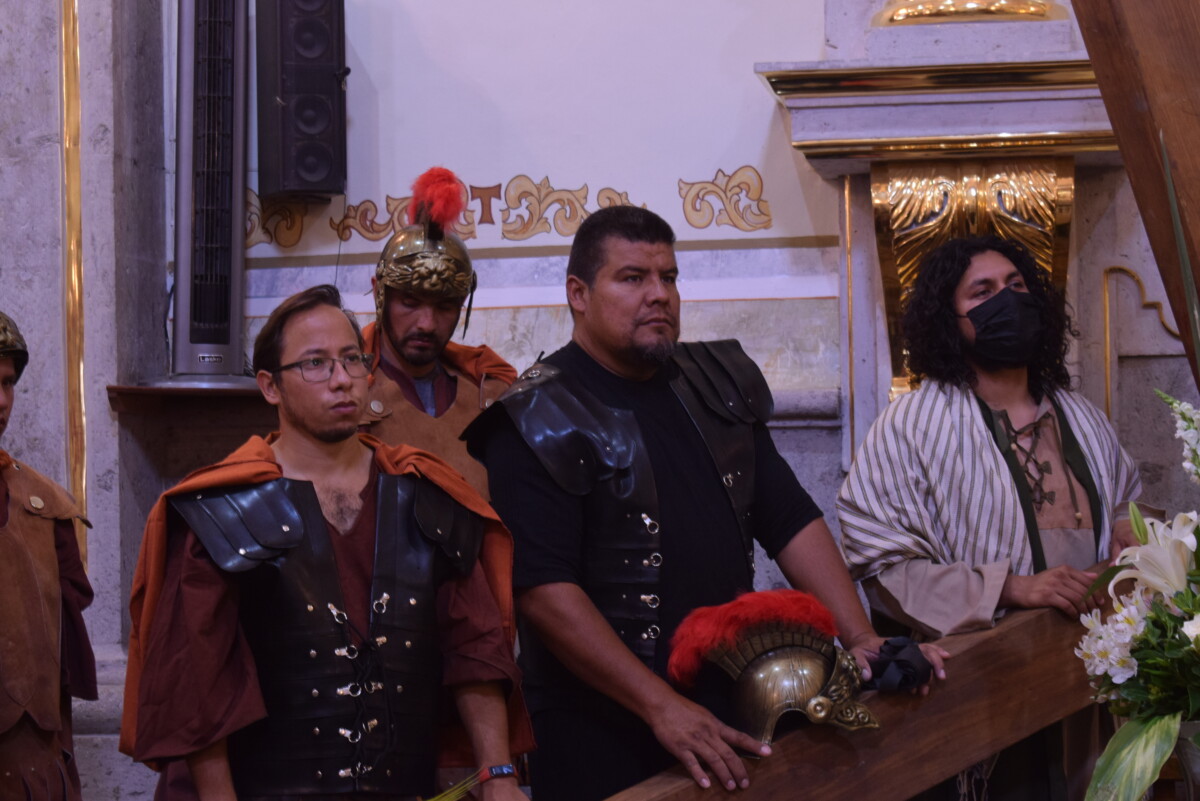
Cast of Roman soldiers
Hundreds of palm branches, accompanied by laurel and rosemary were raised to receive God’s blessing from the priests in charge of the Eucharistic celebration, highlighting the presence of children and young people who alone or in the company of their families attended the ceremony. There were also about six stalls with wax or wheat palms made by people from Michoacán.
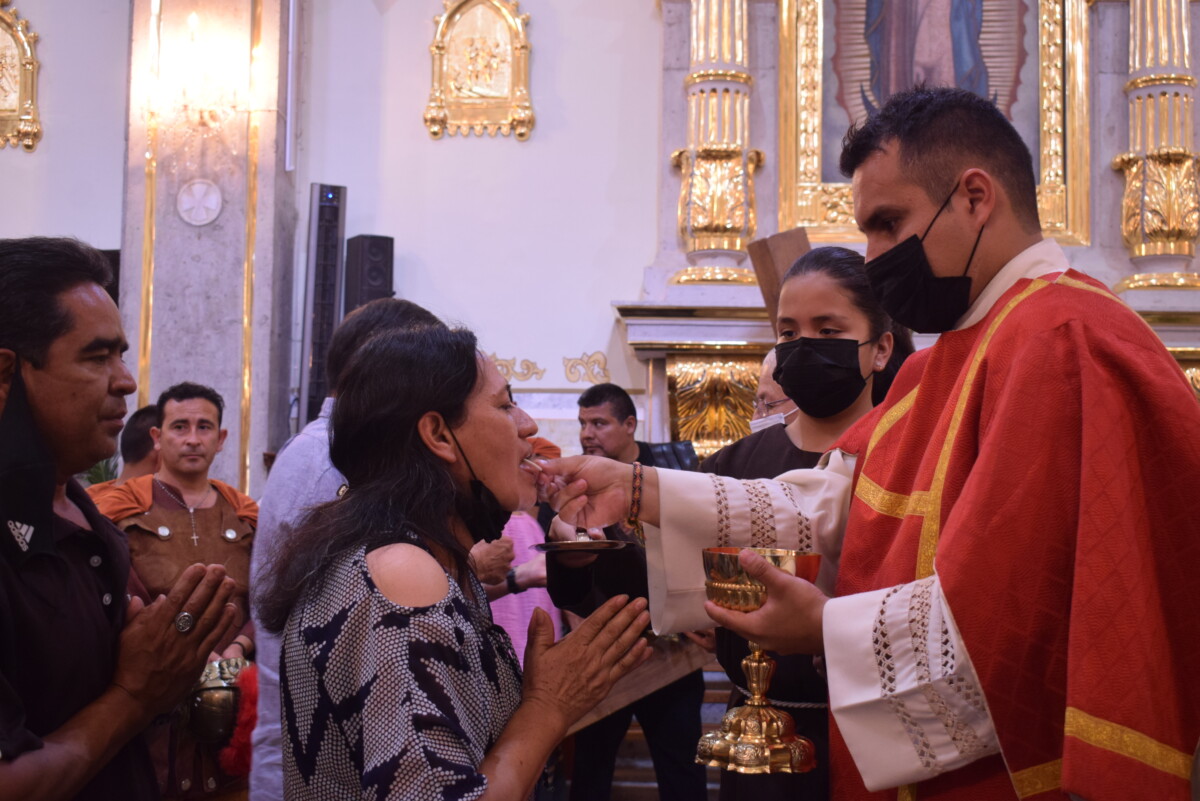
Parishioner receiving the Eucharist during Palm Sunday
The type of palm is irrelevant, its spiritual meaning is based on a symbol of peace with which Jesus was received in Jerusalem. Today, the palms are blessed on Palm Sunday and placed on the altar throughout the year, then burned by the church to use their ashes during the next year’s Ash Wednesday.
Translated by Nita Rudy
Restaurant Cenaduría Memo: 52 years sharing Mexican flavors
María Hilda Robledo Vázquez, opened «Memo» Cenaduría when she was only 20 years old. Photo: Sofía Medeles.
Sofía Medeles(Ajijic).- «Memo’s» is one of the most long-lived and emblematic local businesses in Ajijic. At 72 years old, its founder, Mrs. María Hilda Robledo Vázquez, shared the trajectory of her 52-year business.
María Robledo, better known as Mari, opened the diner when she was only 20 years old. She says that she wanted to start a business, so she started with tacos, then added menudo, until she got to what she currently sells, which is a variety of typical Mexican food dishes.
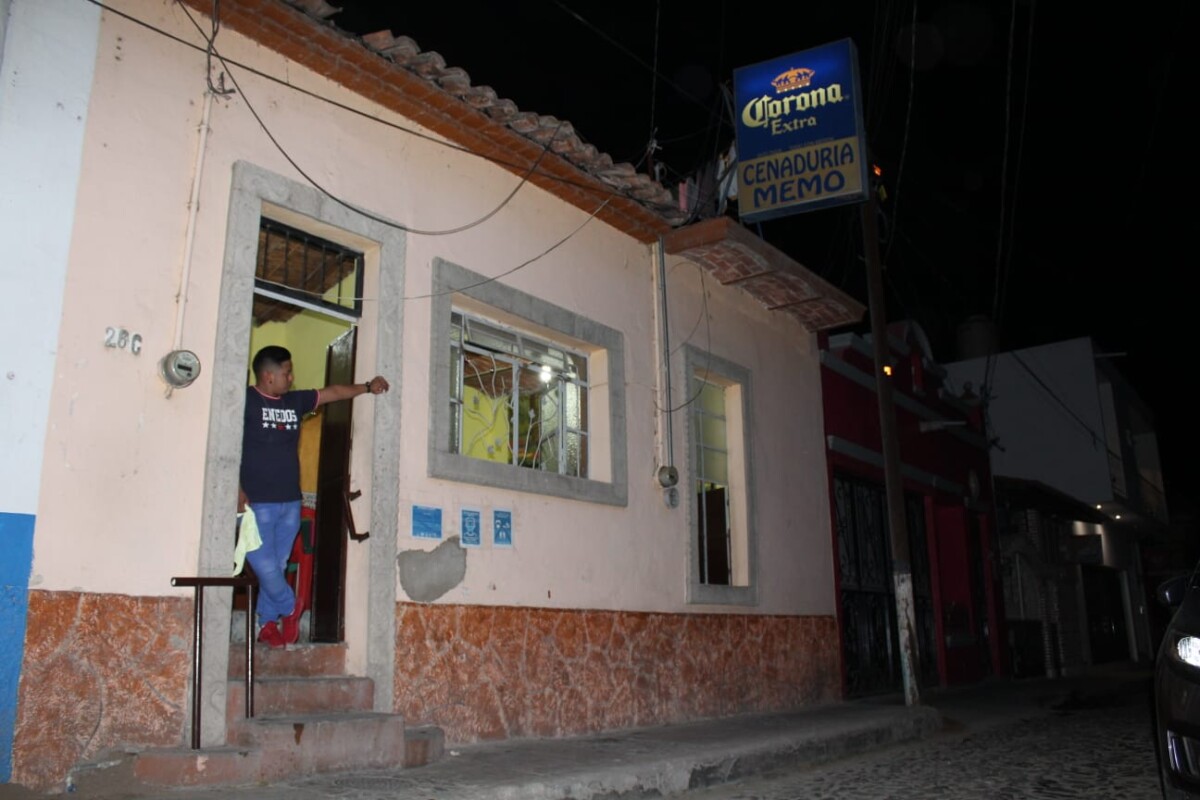
The establishment is located at 25 Hidalgo Street. At the door, Mrs. Mari’s grandson, Alejandro. Photo: Sofía Medeles.
«Before being located where the business is today, we moved from two other places. Before, we were known as «Los Deportes» because we were in a place that was a sports store. Later, my stepfather made a contract with a brewery to put up the billboard, and since his name was Memo, they put it in his name. They said they were going to change it, but in the end they didn’t, and that’s how it stayed’ that’s how we became known,» the Mari related.
Mari Robledo also said that she began to be recognized by the people of Guadalajara when she was visited by some godparents of one of her brothers about six years after starting her business. They told her that they would recommend her to people from Guadalajara, and people from Guadalajara have been coming to visit her ever since.
«Sometimes customers come and tell me, I remember when my parents used to bring me here, and you are still running the business after all this time,» added the founder of the restaurant.
«Memo» has approximately 30 years on Hidalgo Street #25, in the center of the town, where there have been hundreds of tourists both local and national, and even international.
Mari shared that she has learned that her clientele comes through word of mouth, and they always let her know that they were satisfied with her dishes, especially with the pozole, one of her best-selling preparations.
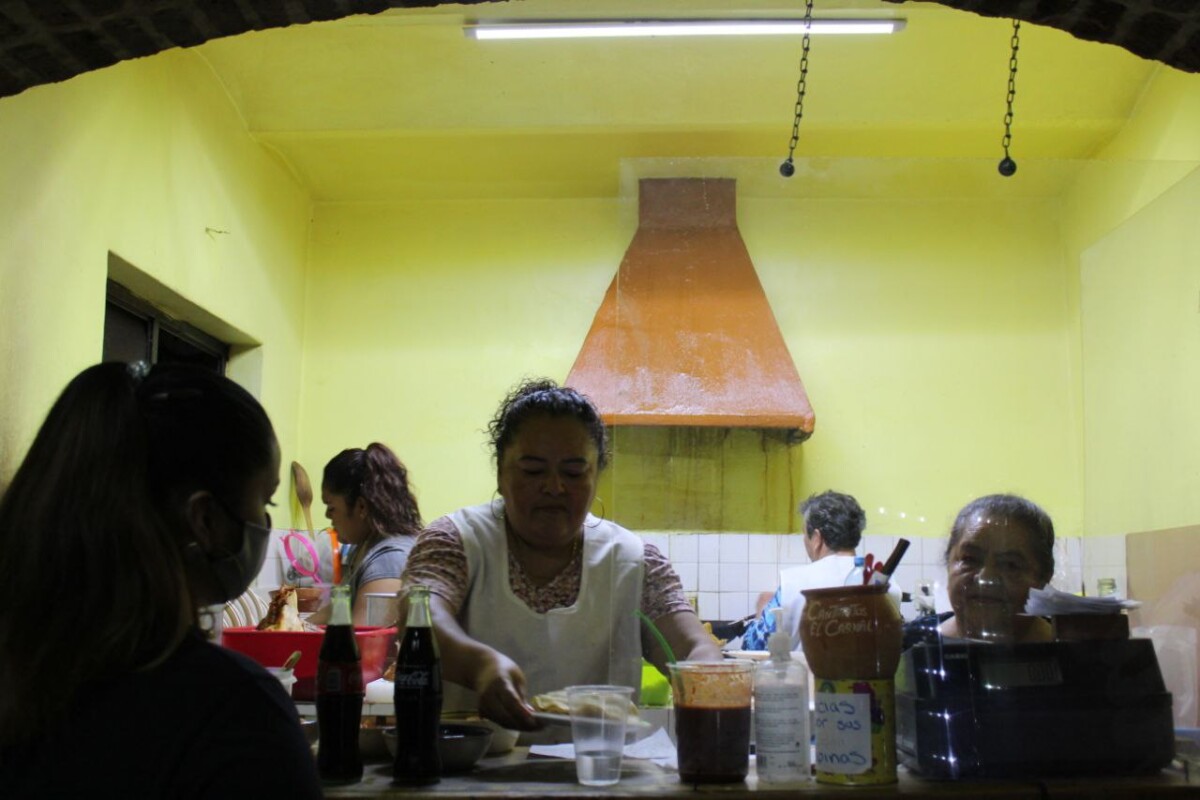
Doña Mari with her workers in the kitchen of the «Memo» diner. Photo: Sofía Medeles.
Since its founding, the business has remained very family-run. At the beginning, Mari worked with her sisters. Later on she worked with her children, Fernando, Laura, Virginia and Alejandrina, who supported her at some point. The last one helps her still.
In addition, her son-in-law Francisco Romero and her grandchildren Izbia, Alejandro, Romina and Fernanda have joined the team; besides, María Elena Martínez, Corazón de Jesús Cerna and Guadalupe Pulido, are her employees who help her in the kitchen.
Although she finds the cooking business exhausting, María Robledo Vázquez hopes that the restaurant will continue for many years to come.
«The business has always been a support to help my children get ahead and give them an education. My daughter Alejandrina already knows how to do things here, and she told me that she would like to continue. I hope she does.»
Finally, Mari thanked all her customers because they have always been unconditional and come back to the restaurant with pleasure.
Translated by Sydney Metrick
© 2016. Todos los derechos reservados. Semanario de la Ribera de Chapala
